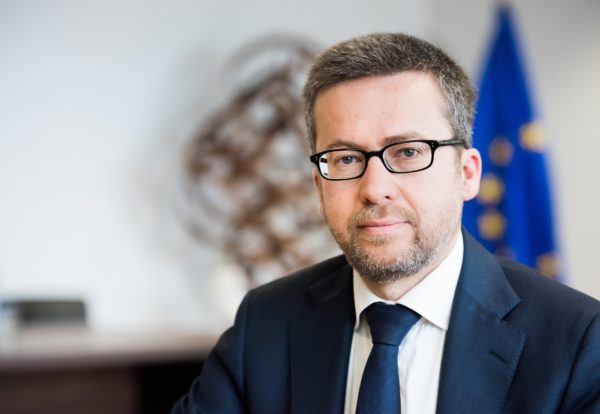| Carlos Moedas’ talk was a breath of fresh air and positivity. Given some of the recent negative and disheartening news surrounding the uncertainties affecting the lives of thousands of researchers across Europe due to Brexit. The key message delivered by the Commissioner was:
“Horizon 2020 is fully open to you, as long as the UK is part of the EU. Please keep taking part. Keep collaborating with your European partners. Keep welcoming researchers from other EU countries into your universities and research teams”. Europe needs the UK’s active engagement in the next Framework Programme and he welcomed the fact that the UK is keen to participate in specific European policies and programmes. In the first part of his speech the Commissioner focused on our common values and the fundamental role that science plays within our European identity. More specifically he mentioned: 1. Respect for science and scientific knowledge, emphasising how Europe is leading the way in strengthening public trust in science, and how this is greatly valued by citizens. The importance of The European Code on Research Integrity and the need to demonstrate to the public that European science operates to the highest standards discussed. In an era where we are bombarded with information a key research question will be what information can be trusted. He pointed towards the fact that he anticipates a “two-geared” internet in the future. One that you can trust (based on science) and one that you don’t, based on bad or no science. This is an area where Europe can become the leader. 2. According to the Commissioner “Europe is at a midway point between two schools of thought”: Individualism and collectivism. Challenging current wisdom and encouraging debates between young academics and more senior ones should be encouraged. ERC is an excellent example of supporting individual researchers with creative ideas. On the other hand, excellent science thrives through collaboration, a distinct feature of European research. Societal challenges for example, fosters collaborations with partners across Europe and the globe. 3. Intolerance to social inequality and environment concerns. Europe is a global leader in climate change, renewable technologies and excels in many fields of social science and humanities. This excellence will attract high level scientists to Europe in the future. The second part of the Commissioner’s speech focused on the next Framework programme and made reference to the work led by Pascal Lamy’s group on the vision for future EU research and innovation. The contribution of an RSE fellow, Iain Gray who brought his huge experience in industrial innovation, was specifically acknowledged. Three of the 11 recommendations of this report received specific mention: 1. Mission-driven research and innovation, however the form this will take is still an open question. The Commissioner also emphasised the potential of engaging the public. 2. Creation of a European Innovation Council built on a similar concept as the ERC. This pilot will create new opportunities for Europe’s innovators to develop their ideas. 3. Make international cooperation a trade-mark of EU research and innovation. New ways to achieve this need to be found in order to make it easier for scientists to collaborate internationally. The last part of the speech focused on the importance of international collaboration where Moedas cited a recent study in Nature, which demonstrates a direct link between being open and producing high impact research. The rise of EU research impact was linked to one of H2020’s aims of being “open to the world”, meaning that excellent science is global and collaborative. In the UK 30% of all scientific articles are internationally co-authored, with over 21% of researchers being internationally mobile and moving between countries. He reiterated that the next framework programme should be ambitious and more international and that excellence will remain at its core. The EU now outperforms the US on the top 1% of cited papers and attributed this Europe’s Openness and went on to say that “we must not risk slipping backwards, into less open ways of approaching the world”. The new framework should support greater international mobility of scientists, enable more collaborative projects with non-European partners and increase support to research and innovation to address global challenges. The speech finished on a very positive note with the Commissioner emphasising that the UK, and especially Scotland, have a strong tradition of excellent science and that “the other Member States want to continue working with their partners in the UK”. As the Lamy group put in their report, “Working together in the future is an obvious win-win”. The commissioner reminded everyone of Professor MacCormick’s words “we are all piloting the boat in the same direction.” Now more than ever this is very relevant and serves as reminder that we should work on what unites us as Europeans, and ”science is one of our strongest common values”. The full speech and video recording can be found here. Dr Theodora Lola-Luz and Dr Eirini Theofanidou are EU Proposal Coordinators in the European Funding Team within the Research Support Office.
|




This really was a positive speech from Moedas. Great to see a clear and concise break-down of it here.